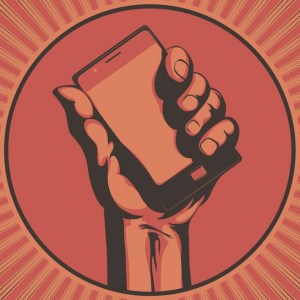 The mobile industry is at an exciting stage: There are enough smartphone customers that there’s a huge field of opportunity for device makers, carriers, and app makers, but the market is still fragmented enough that no one company dominates. In this kind of frothy market, the risks are high, but the potential payoffs are huge, too.
The mobile industry is at an exciting stage: There are enough smartphone customers that there’s a huge field of opportunity for device makers, carriers, and app makers, but the market is still fragmented enough that no one company dominates. In this kind of frothy market, the risks are high, but the potential payoffs are huge, too.
The kind of people who thrive in this world are disruptive individuals. Troublemakers. Shakers-up of the status quo. Yes, we’re accustomed to writing about companies and their products, but true innovation always originates with human beings.
That’s why VentureBeat is naming the 10 individuals below as the Top Mobile Movers for 2012.
We asked for your nominations a week ago, sifted through the suggestions, added a few of our own, and vigorously debated the entrants. The finalists, here, are our admittedly idiosyncratic and (we hope) provocative choices. These 10 people are unusually effective at disrupting business as usual.
In two weeks, at our Mobile Summit, April 2-3, we’ll announce which of these 10 finalists we’re naming as the Top Mobile Mover. So stay tuned.
Want to be part of the debate? Use the form at the bottom of this post to vote on who you think is the most disruptive, innovative person on the list. Let us know what you think in the comments section. Or apply to take part in the conversation in real time at the Mobile Summit. It’s an exclusive conference of just 180 executives and investors, and while the room is filling up fast, we’re still accepting last-minute applications to participate. I hope to see you there.
Without further ado, here’s the list (in alphabetical order).
Jack Dorsey
CEO/Founder, Square; Executive Chairman/Founder, Twitter
 As the founder of Square, Dorsey is revolutionizing mobile payments in a way that much bigger companies had failed to do. A simple white dongle that plugs into your smartphone’s headphone jack is all you need, and it’s so cheap to manufacture that the company gives them away by the basketful.
As the founder of Square, Dorsey is revolutionizing mobile payments in a way that much bigger companies had failed to do. A simple white dongle that plugs into your smartphone’s headphone jack is all you need, and it’s so cheap to manufacture that the company gives them away by the basketful.
And then there’s Twitter, which we think of as a social network now but which started as a mobile technology company, stitching together groups of people via SMS text messages. Even now, Twitter is one of the most widely-used smartphone apps on any platform.
Most entrepreneurs wait to finish one great company before they start another. Dorsey is doing them both at the same time. And both have made huge waves.
John G. Hering
CEO/Founder, Lookout Mobile Security
 Long before most people recognized the threat of viruses and trojans on mobile phones, Hering was building a company to stop those threats. Lookout Mobile Security was one of the earliest companies to tackle smartphone security and now offers popular security software for Android phones as well as Android tablets and the iPad.
Long before most people recognized the threat of viruses and trojans on mobile phones, Hering was building a company to stop those threats. Lookout Mobile Security was one of the earliest companies to tackle smartphone security and now offers popular security software for Android phones as well as Android tablets and the iPad.
Like many disruptors, Hering’s not above pulling off attention-getting stunts. His BlueSniper project demonstrated that it was possible to crack into a phone via weaknesses in the Bluetooth protocol — from 1.2 miles away.
Jaakko Iisalo
Senior Game Designer, Rovio
 Everyone knows about Angry Birds, which people around the planet play for a staggering 300 million minutes per day. (As of October, 2011, so it’s probably more than that now.) But where did Angry Birds come from? From the fertile (and perhaps slightly twisted) imagination of Jaakko Iisalo, the software designer who came up with the original concept art and then played a key role in developing the early versions of the game.
Everyone knows about Angry Birds, which people around the planet play for a staggering 300 million minutes per day. (As of October, 2011, so it’s probably more than that now.) But where did Angry Birds come from? From the fertile (and perhaps slightly twisted) imagination of Jaakko Iisalo, the software designer who came up with the original concept art and then played a key role in developing the early versions of the game.
While many people at Rovio helped build the game, Iisalo’s contribution deserves special mention. It’s worth noting that seldom has one idea led so many millions of people to waste so many millions of hours. If there’s a game capable of reaching a billion players, Angry Birds might be it.
Dr. Paul E. Jacobs
CEO, Qualcomm
 You might not think about Qualcomm much, but chances are good that you use its products. The company’s 3G and 4G chip technologies, as well as its fast Snapdragon processors, have helped make smartphones cheaper, more accessible, and at the same time more powerful. And Qualcomm played a key role in bringing the first Android-based smartphones to market.
You might not think about Qualcomm much, but chances are good that you use its products. The company’s 3G and 4G chip technologies, as well as its fast Snapdragon processors, have helped make smartphones cheaper, more accessible, and at the same time more powerful. And Qualcomm played a key role in bringing the first Android-based smartphones to market.
Much of that has been due to the leadership of Paul Jacobs, who has been the chief executive of Qualcomm since 2005. He’s helped transform the chipmaker into a powerhouse in the mobile industry.
Qualcomm also drives new, emerging technologies. For instance, it is developing a new display tech, called Mirasol, which promises the low power consumption of E Ink while offering multiple colors like an LCD. And it’s investigating wireless charging technologies that could eliminate the need for carrying around wall warts.
Jacobs is the son of Qualcomm founder Irwin Jacobs. Don’t underestimate him on that account, though: He holds 40 patents of his own.
Cliff Kushler
Vice President, Nuance Communications
 Kushler, the founder of Swype, has put his technology in front of an enviable number of people. His first invention, T9, was a predictive text tool to simplify “typing” on 12-key phone keypads, greatly reducing the number of digits you had to mash. It has been installed on more than 4 billion devices since its invention in the 1990s, according to Nuance, which now owns the technology.
Kushler, the founder of Swype, has put his technology in front of an enviable number of people. His first invention, T9, was a predictive text tool to simplify “typing” on 12-key phone keypads, greatly reducing the number of digits you had to mash. It has been installed on more than 4 billion devices since its invention in the 1990s, according to Nuance, which now owns the technology.
Kushler’s next act was Swype, which launched about two years ago and has now shipped on more than 150 million phones. (It, too, is owned by Nuance.) Swype simplifies “typing” on 12-key keypads by letting you zip from letter to letter without the need to waste time by lifting your finger between key presses.
For someone whose inventions are used by billions upon billions of people, Kushler is remarkably non-famous. Friends describe him as “humble, mystic, honorable, and brilliant.” Yet his technologies have made a significant, if subtle, difference in the world. Saving a few seconds might not seem like much when you’re entering a single message, but over time, making it easier to enter text makes it easier for people to communicate, and that is a transformative change.
Scott Kveton
CEO/Founder, Urban Airship
 Urban Airship isn’t a household name, but it’s used by a ballooning number of companies to make their mobile apps more useful and more relevant. Its tools combine smart push notifications with geo-location and context information to send just the right kind of messages at the right time, and also enable in-app purchases. Since its launch in 2009, Urban Airship has attracted more than 25,000 customers (companies building apps), sent out more than 10 billion messages, and connected to more than 100 million mobile devices.
Urban Airship isn’t a household name, but it’s used by a ballooning number of companies to make their mobile apps more useful and more relevant. Its tools combine smart push notifications with geo-location and context information to send just the right kind of messages at the right time, and also enable in-app purchases. Since its launch in 2009, Urban Airship has attracted more than 25,000 customers (companies building apps), sent out more than 10 billion messages, and connected to more than 100 million mobile devices.
Cofounder Scott Kveton is an outside-the-box kind of guy: His previous startup was a bacon-shipping service for consumers. Before that, he ran online identity company JanRain and helped found the OpenID foundation, which supplies the kind of plumbing that makes it possible for you to log in to one site using the credentials of another site.
Mary T. McDowell
Vice President, Nokia
 Sometimes disruption comes in the form of business innovation, not bleeding-edge technology. Executive vice president Mary T. McDowell leads Nokia‘s Mobile Phones business unit, which accounts for about half of Nokia’s business. It’s not the more glamorous, smartphone side of the business, but it’s the one that affects the greatest number of people. McDowell’s devision supplies technology and services that will connect the “next billion” people to the internet.
Sometimes disruption comes in the form of business innovation, not bleeding-edge technology. Executive vice president Mary T. McDowell leads Nokia‘s Mobile Phones business unit, which accounts for about half of Nokia’s business. It’s not the more glamorous, smartphone side of the business, but it’s the one that affects the greatest number of people. McDowell’s devision supplies technology and services that will connect the “next billion” people to the internet.
For example, the company’s Nokia Asha line, based on Nokia’s Series 40 operating system, is meant to be an accessible, affordable quasi-smartphone, or “Smartphone Lite.” Asha phones are now driving millions of downloads per day from the Nokia store, indicating that people in the developing world are adopting the devices. And Nokia recently celebrated the sale of the 1.5 billionth S40 device, to a young woman in Brazil who purchased a Nokia Asha device.
Terry Myerson
Corporate Vice President, Microsoft
 Myerson has been overseeing the strategy and development of Microsoft’s Windows Phone platform since 2011, and has been a key player in the business since its inception in 2008, which he became the engineering lead for Microsoft’s mobile group. Noted for his “no-nonsense” approach, Myerson helped lead the charge for Microsoft’s momentous “reset,” when the company essentially threw out everything it had been doing with Windows Mobile and reinvented its mobile operating system from the ground up.
Myerson has been overseeing the strategy and development of Microsoft’s Windows Phone platform since 2011, and has been a key player in the business since its inception in 2008, which he became the engineering lead for Microsoft’s mobile group. Noted for his “no-nonsense” approach, Myerson helped lead the charge for Microsoft’s momentous “reset,” when the company essentially threw out everything it had been doing with Windows Mobile and reinvented its mobile operating system from the ground up.
The gamble was a big one, and it’s still too soon to tell whether it will pay off. Microsoft is coming from far behind both iOS and Android, and has far to go before it can even catch the BlackBerry in the smartphone market. But if anything has the potential to be a spoiler in this fight, it’s Windows Phone. Microsoft’s partnership with heavyweight phone maker (and fellow smartphone also-ran) Nokia gives it even more clout.
Windows Phone is early in its lifecycle, but it’s an attractive, responsive operating system that’s getting a lot of notice. You can count on it to make big waves in the mobile market this year.
Andy Rubin
Senior Vice President, Google
 Few living individuals have played a more prominent role in the smartphone revolution than Andy Rubin. For his first act, Rubin cofounded Danger Inc., which designed what most of us knew as the T-Mobile Sidekick — the proto-information device that was the tool of choice for savvy texters and data users in the days before the iPhone upended the industry.
Few living individuals have played a more prominent role in the smartphone revolution than Andy Rubin. For his first act, Rubin cofounded Danger Inc., which designed what most of us knew as the T-Mobile Sidekick — the proto-information device that was the tool of choice for savvy texters and data users in the days before the iPhone upended the industry.
Then Rubin founded Android Inc. to create a new, open-source mobile operating system. Before it could release a product, Google acquired it, and Rubin now heads development of the Android operating system. In a few short years, Android has grown to become the dominant mobile OS on smartphones, and it’s picking up speed fast in the tablet arena too.
Ehud Shabtai
CTO/Founder, Waze
 Waze makes a driving navigation app with a twist: Its maps and traffic data are all supplied by Waze users. Ehud Shabtai started the company, according to his official biography, because he kept getting lost. A hacker, Shabtai searched for technical solutions, and started building the project that would become Waze.
Waze makes a driving navigation app with a twist: Its maps and traffic data are all supplied by Waze users. Ehud Shabtai started the company, according to his official biography, because he kept getting lost. A hacker, Shabtai searched for technical solutions, and started building the project that would become Waze.
With more than 15 million users, Waze’s traffic data has become reliable enough that it’s even powering local TV traffic reports. The company has also built in Siri-like voice commands, so you can simply wave your hand in front of your phone and ask it to give you traffic reports.
More than simply powering a lot of users, Waze has the potential to turn into a real community of people who are crowdsourcing map creation simply by driving around. What’s more, it could potentially make traffic overall flow in a more intelligent way. That’s a development worth getting excited about.
[polldaddy poll=6060357]
Top image credit: Pixel Embargo/Shutterstock. Jack Dorsey photo: Kevin Krejci/Flickr.

